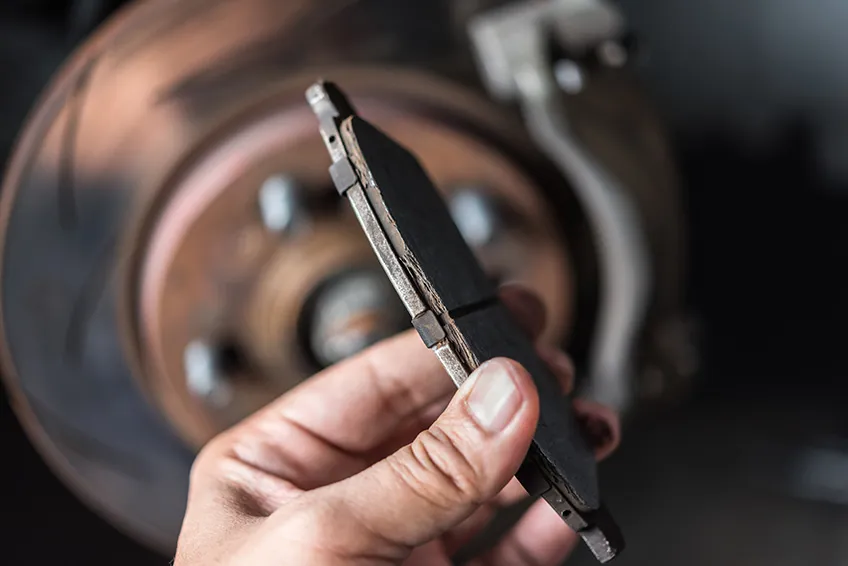What is brake fading?

Brake fade is a term used to describe a sudden decrease in your car’s braking ability. As you can imagine, this can be dangerous if you need to make a sharp stop and can result in accidents and injuries – so it’s important to get the issue resolved as quickly as possible. But how can you spot brake fade when it happens, what causes it, and what can you do about it? Keep reading to learn more.
What is brake fade?
Picture the scene. You’re on a busy road with cars ahead and behind, and the car in front makes a sudden stop. You slam on the brakes, but your car doesn’t stop as quickly as you’re used to. You’ve avoided a crash, but only just – so what’s wrong with your brakes?
This is what we call brake fade. It’s where your brake pads are generating less friction than usual – and friction is the main force that slows your car to a halt. This means you have to put your foot down harder and for longer in order to stop your car. Slower, less effective braking can lead to costly damage and repairs in the event of an accident, as well as potentially causing harm to yourself, your passengers or other road users.
What causes brake fade?
The most common cause of brake fade is all about heat. The friction between your brake pads and discs generates a lot of heat as a natural byproduct. This heat builds up while the brake pedal is depressed, and dissipates when you release the brakes. Your brake pads are designed to hold up under high temperatures so they can deal with this – but there’s only so much heat they can take.
In an ideal world, you’d brake for a short period of time and then release the pedal. The heat generated through friction would dissipate and your brake pads would cool down before you have to use them again. However, prolonged braking interrupts this progression of events. In situations where you have the brake pedal depressed continuously or you have to brake a lot in a short space of time, the brake pads don’t get the chance to cool down. Heat builds on heat until your brake pads are dealing with temperatures they weren’t made for – damage, leading to brake fade, is a natural result. This can also happen if your vehicle is overloaded, meaning it takes more friction, and therefore more heat, to stop the car.
As well as this, there are two other ways that brake fade can occur. The first is brake fluid fade, which is where your brakes overheat to such a degree that the water in your brake fluid evaporates into steam. This can result in inefficient braking which feels spongy or soft. Alternatively, you may experience brake fade as a result of worn out brake pads. As the material of your brake pads starts to degrade, you may find it takes longer to stop the car than usual.
What helps with brake fade?
If you’ve noticed your car taking longer than usual to stop when you apply the brakes, it’s a good idea to take it in for a service to discover the root of the problem and get it fixed by experienced professionals. Depending on the cause of brake fade, this may mean replacing the brake pads with fresh ones, getting new discs or calipers, or possibly changing the brake fluid to refresh it. Your mechanic should be able to explain what they’re doing and why.
They may also give you advice on how to avoid the problem in future. As brake fade can be caused by prolonged braking, it’s best to avoid doing so where you can – unless, of course, you need to brake long and hard to stay safe. One thing to watch out for is resting your foot on the brake pedal while going downhill – it’s a habit that lots of drivers have, but that gentle pressure still causes friction on the brake pads which can lead to brake fade and a sooner need for replacement.
Another way you can help to reduce the likelihood of brake fade is to use your brakes less. While this may sound counterintuitive, it’s actually quite simple: often you can simply ease off the accelerator a bit earlier and then not need to brake at all. Obviously sometimes braking is unavoidable, but making tiny changes to the way you drive and looking ahead to anticipate your next move can help to prolong the lifespan of your braking system.
It’s also a good idea to keep up with a routine of regular servicing and maintenance to make sure your brakes are in good condition. As well as helping you to spot brake fade before it becomes an issue, regular servicing highlights and fixes problems in other parts of your car to keep you as safe as possible on the road.